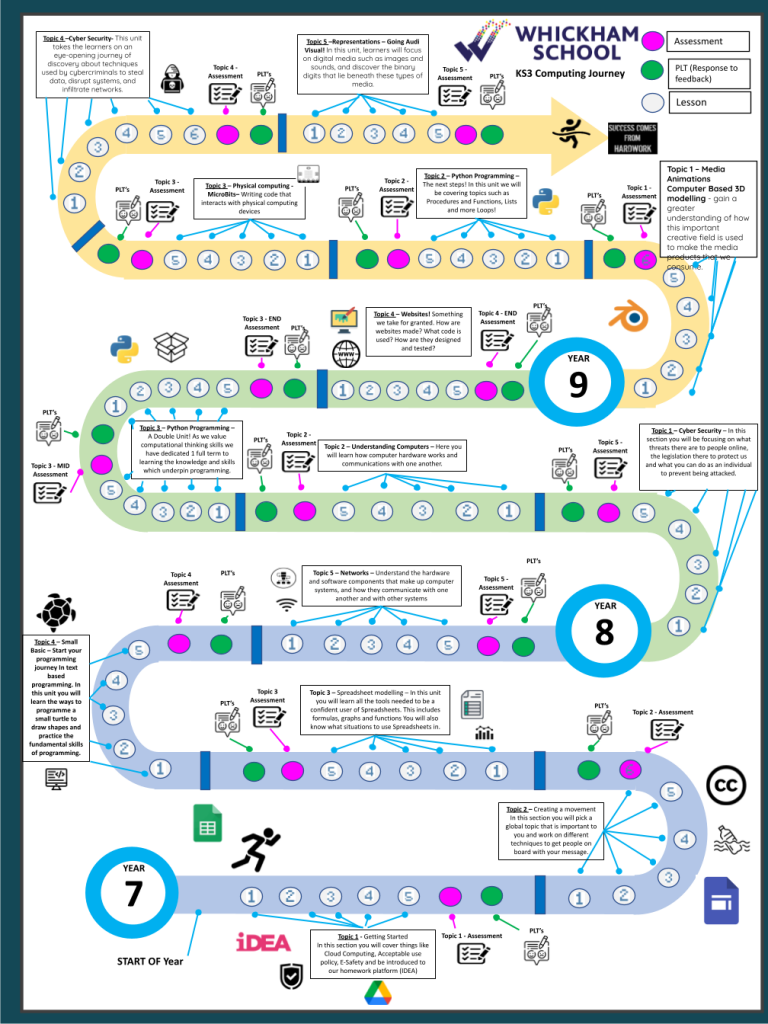Computing Curriculum
Our aim is to provide a high-quality computing education which equips pupils to use computational thinking and creativity to understand and change the world. The curriculum will teach children key knowledge about how computers and computer systems work, and how they are designed and programmed. Learners will have the opportunity to gain an understanding of computational systems of all kinds, whether or not they include computers.
By the time they leave Whickham School, pupils will have gained key knowledge and skills in the three main areas of the computing curriculum: computer science (programming and understanding how digital systems work), information technology (using computer systems to store, retrieve and send information) and digital literacy (evaluating digital content and using technology safely and respectfully). The objectives within each strand support the development of learning across the key stages, ensuring a solid grounding for future learning and beyond.
What do we want to achieve?
- a practical curriculum that seeks every opportunity to apply theoretical knowledge to real world contexts.
- a relevant and diverse curriculum that will expose pupils to current thinking and practice.
- a challenging and engaging curriculum that encourages pupils to solve problems independently
- a curriculum which fosters a love of learning and a clear development of skills, allowing our team to share and model their passion for their subject
- a curriculum which allows all pupils, no matter what ability or classroom they find themselves in, to make the best possible progress
What skills and knowledge will pupils develop?
- Computing/IT Subjects:
- Pupils are responsible, competent, confident and creative users of information and communication technology.
- Develop an increasing competence in the world of ubiquitous computing, fostering a high level of digital literacy.
- Pupils are able to explore the World Wide Web in a safe and responsible manner.
- Demonstrate a wider understanding of how IT/Computing impacts upon the legal, ethical, professional and social aspects of our lives.
- Pupils can understand and apply the fundamental principles and concepts of computer science, including abstraction, logic, algorithms and data representation
- Pupils can analyse problems in computational terms, and have repeated practical experience of writing computer programs in order to solve such problems
- to make reasoned judgements
- to design, program, evaluate and refine solutions.
- Pupils can evaluate and apply information technology, including new or unfamiliar technologies, analytically to solve problems
Access for all pupils
- All learners must be encouraged to improve both their confidence and competence in digital literacy during all aspects of their learning, this is inclusive of cross curricular links, and also any elements of their education whereby IT might be better exploited to improve their learning
- Feedback used to direct differentiation and progress through the topics
- Tracking sheets used to identify whole class misconceptions and targeted intervention
- Scaffolding present through curriculum resources which seek to support less able pupils in segmenting their learning and allow more able pupils to challenge their understanding
- Use of WAGOLLs, helping hands and challenge tasks available for every topic
- Revision checklists produced to aid pupils in the production of comprehensive revision resources to consolidate learning
Computing learning journey


